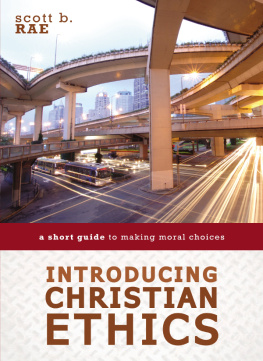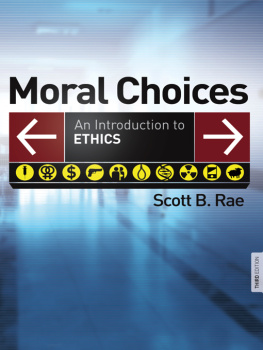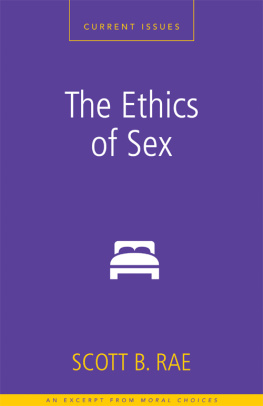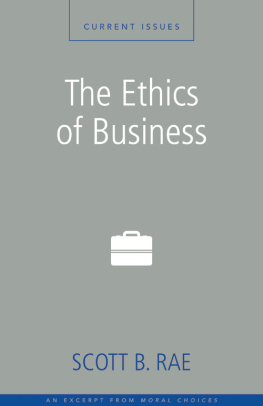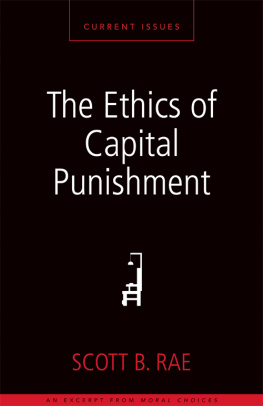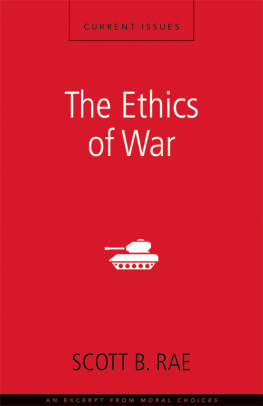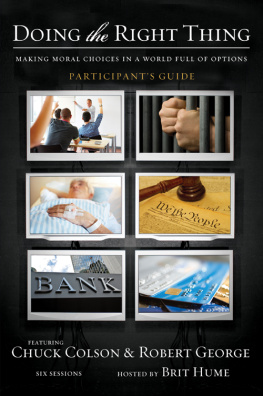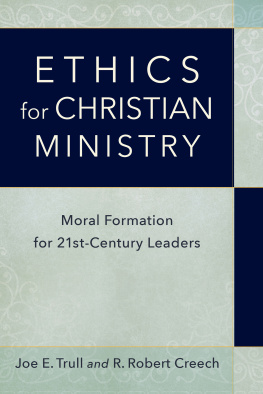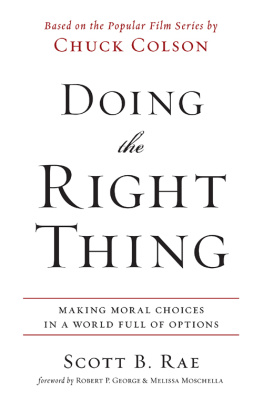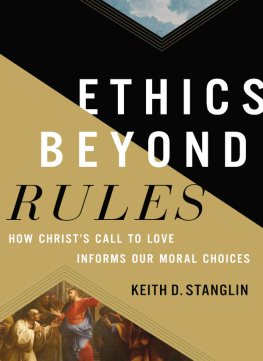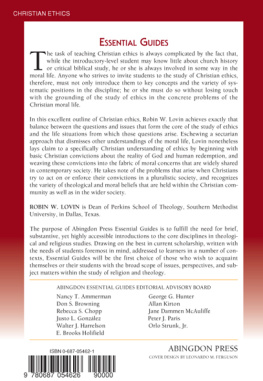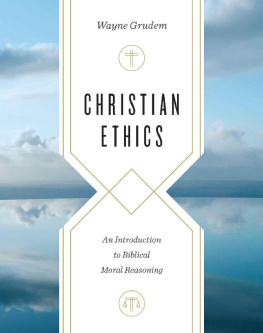OTHER BOOKS BY SCOTT B. RAE
The Ethics of Commercial Surrogate Motherhood: Brave New Families? (Praeger Publishing, 1994)
Moral Choices: An Introduction to Ethics (Zondervan, 1995; 2nd Edition, 2000; 3rd Edition, 2009)
Brave New Families: Biblical Ethics and Reproductive Technologies (Baker Book House, 1996)
Beyond Integrity: A Judeo-Christian Approach to Business Ethics, with Kenman L. Wong. (Zondervan, 1996; 2nd Edition, 2004; 3rd Edition, 2012)
Embryo Research and Experimentation (Crossroads Monograph Series on Faith and Policy, 1997)
Bioethics: A Christian Approach in a Pluralistic Culture, with Paul M. Cox (Eerdmans/Paternoster, 1999)
Body and Soul: Human Nature and the Crisis in Ethics, with J. P. Moreland (InterVarsity Press, 2000)
Biotechnology and the Human Good, with C. Ben Mitchell et al. (Georgetown University Press, 2007)
The Virtues of Capitalism: A Moral Case for Free Markets, with Austin Hill (Northfield Publications, 2011)
Business for the Common Good, with Kenman L. Wong (IVP Academic, 2011)
Outside the Womb: Moral Guidance for Assisted Reproduction, with D. Joy Riley, MD (Moody Press, 2012)
Doing the Right Thing: Making Moral Choices in a World Full of Options (Zondervan, 2013)
ZONDERVAN
Introducing Christian Ethics
Copyright 2016 by Scott B. Rae
An abridgment of Moral Choices
ePub Edition July 2016: ISBN 978-0-3105-2119-8
Requests for information should be addressed to:
Zondervan, 3900 Sparks Drive SE, Grand Rapids, Michigan 49546
Library of Congress Cataloging-in-Publication Data
Names: Rae, Scott B., author. | Rae, Scott B., author. Moral choices.
Title: Introducing Christian ethics : a short guide to making moral choices / Scott B. Rae.
Description: Grand Rapids : Zondervan, 2016. | Abridgement of: Moral choices.
Identifiers: LCCN 2016017309 | ISBN 9780310521181 (softcover)
Subjects: LCSH: Christian ethics
Classification: LCC BJ1251 .R236 2016 | DDC 241--dc23 LC record available at https://lccn.loc.gov/2016017309
Any italics in Scripture quotations are added by the author for emphasis.
All Scripture quotations, unless otherwise indicated, are taken from The Holy Bible, New International Version, NIV. Copyright 1973, 1978, 1984, 2011 by Biblica, Inc. Used by permission of Zondervan. All rights reserved worldwide. www.Zondervan.com. The NIV and New International Version are trademarks registered in the United States Patent and Trademark Office by Biblica, Inc.
Scripture quotations marked NLT are taken from the Holy Bible, New Living Translation. 1996, 2004, 2007, 2013 by Tyndale House Foundation. Used by permission of Tyndale House Publishers, Inc., Carol Stream, Illinois 60188. All rights reserved.
Any Internet addresses (websites, blogs, etc.) and telephone numbers in this book are offered as a resource. They are not intended in any way to be or imply an endorsement by Zondervan, nor does Zondervan vouch for the content of these sites and numbers for the life of this book.
All rights reserved. No part of this publication may be reproduced, stored in a retrieval system, or transmitted in any form or by any meanselectronic, mechanical, photocopy, recording, or any otherexcept for brief quotations in printed reviews, without the prior permission of the publisher.
Cover Image: Superstock.com
Interior design: Kait Lamphere
16 17 18 19 20 21 /DHV/ 20 19 18 17 16 15 14 13 12 11 10 9 8 7 6 5 4 3 2 1
CONTENTS
Chapter 1. Starting at the Beginning:
How does my work connect to my spiritual life and my service to God?
Imagine that you live in a world where you can do anything you want, and no matter what you do, you will never get caught. Nor will you ever have to worry about any consequences for these actions. For example, you can rob a bank, cheat in school, take revenge on whomever you want to, commit violent crimes, lie whenever you want, go back on your word whenever convenient, or sleep with whomever you choose. Would you do any, or all, of those things? I suspect many of you would be tempted to do at least some things commonly regarded as immoral, not to mention some of the illegal things. But I also suspect most of you would not do them. Why not? Although you might not be able to express it precisely, I would bet that many people would not do these things because they consider being a good person to be an important part of living a good life. That is, you consider it a good thing to be a good person.
MORALITY AND THE GOOD LIFE
But lets think about that a bit more. What is it about morality, or virtue, that is bound up with living a good life? The ancient philosophers affirmed that being a good person and living a good life went together and that success in life was measured by what kind of person you were as opposed to what you accomplished or accumulated. For example, Aristotle connected happiness with being a good person. He said, Happiness is an activity of the soul in accordance with virtue. Epicurus put it this way: It is not possible to live pleasantly without living prudently, honorably and justly. This certainly reflects the teaching of Jesus himself when he said to his disciples, What good is it for someone to gain the whole world, yet forfeit their soul [a part of which includes their character]? (Mark 8:36).
Even today, most people, at least intuitively, make that connection between good character and a good life. This is why we admire the moral heroes of our time, and conversely, why we look skeptically at someone who achieves much but is devoid of character. For example, Mother Teresa remains one of the most admired people in the world, even though she had little of what counts for success in our culture. On the other hand, the person who is at the top of his or her profession but who got there by running over people, has had multiple failed marriages, and is alienated from his or her childrenwe have a harder time thinking of this person as being successful in life. We often say of this person that they got to the top of the ladder, only to realize it was leaning against the wrong wall.
I heard a vivid example of this when I was a PhD student some years ago. It made an indelible impact on me, and I vowed not to repeat the mistakes I had learned about. I was the teaching assistant for a distinguished professor in our department, and part of that responsibility involved attending all the class sessions. On the final day of class for that term, the professor was making a point and used his personal life as an example. He told his students about how he had ordered his life early in his career, when his children were young. He spoke with great regret about how he had spent far too many evenings and weekends in his study, writing books and articles to establish himself professionally, at which he had succeeded, since he was well respected in his field. But he also spoke of how he was alienated from all his children today, and it broke his heart to recognize that those two things were connected. I suspect he would admit that he was a professional success but that no amount of professional success compensated for his failures as a father. He realized that professional success and life success were two different things. I suspect he might have seen himself in Jesuss statement, What good is it for someone to gain the whole world, yet forfeit their soul?

